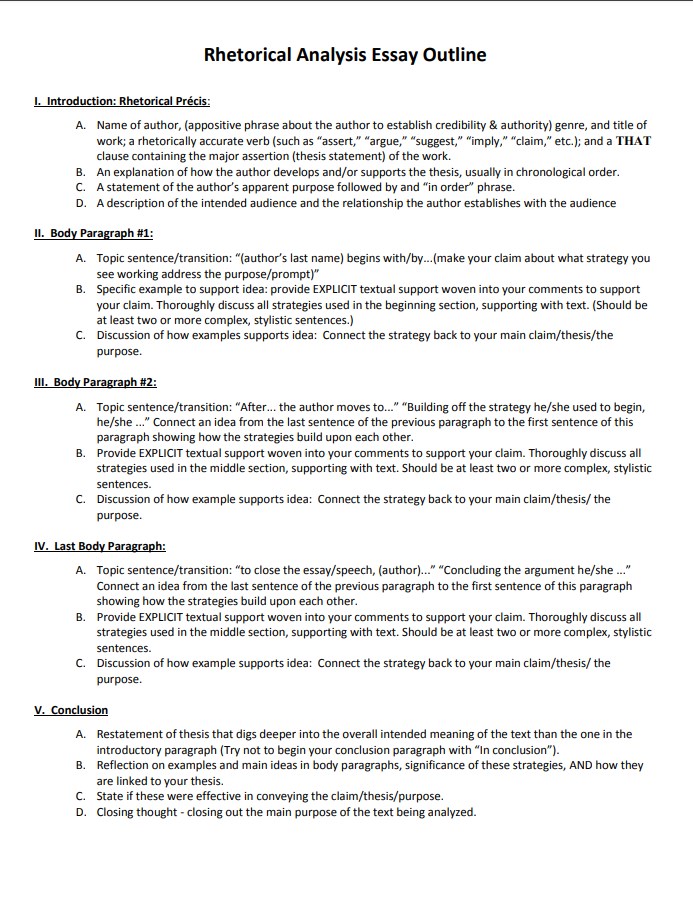Rhetorical Essay Outline I. Introduction: Rhetorical Précis: A. Name of author, (appositive phrase about the author to establish credibility & authority) genre, and title of work; a rhetorically accurate verb (such as “assert,” “argue,” “suggest,” “imply,” “claim,” etc.); and a THAT 11/14/ · Save your outline as a Word or Google doc attachment and submit your assignment as a file upload. Sample Topic Sentence Outline. Here is the beginning of a topic sentence outline for a rhetorical analysis essay based on Nelson Mandela’s “Poverty” speech. Note the three color-coded elements of the thesis (topic, claim, list of main ideas) 4/10/ · No rhetorical outline is complete without a proper ending. A tip from the pros is not to leave your audience hanging. Draw out the strengths of your text and key points to remember. A great conclusion will reinforce the value of your analysis and give
Rhetorical Analysis Essay Outline With Example
Home Blog Writing a Rhetorical Analysis Essay - A Complete Guide Rhetorical Analysis Essay Outline. Students often freak out when they hear the professor assigning a rhetorical analysis essay, rhetorical essay outline. It is considered to be one of the most challenging rhetorical essay outline and it sure is a little complicated, but definitely not impossible.
The reason why students find rhetorical essays to be a daunting task is the fact that writing such essays requires analysis of anything ranging from a literary work to a piece of art, or even an advertisement, rhetorical essay outline. The explanation also includes the extent to which he achieved his goal.
However, there is absolutely no need to be intimidated by it. Once you figure out the design to follow, writing a rhetorical analysis essay will be a piece of cake. The outline for any piece of writing is just like a skeleton, keeping a human body erect and well-structured.
Following the correct rhetorical analysis essay outline will make the writing process logical and ten times easier. Before you jump straight to writing, take your time to read and understand the original text carefully and analyze the information side by side.
Focus on the author, his intended audience, his purpose, the setting and other details. To learn how to write a rhetorical analysis essay, continue reading the section given below. The introduction section of your essay is the part where you inform your readers about the original text that you are going to analyze. Keep this information clear and to the point by focusing on important aspects of the text only. Also, the introductory paragraph must specify whether or not the author was successful in achieving his goal.
Start your introduction with an interesting hook, rhetorical essay outline. Briefly describe the author and the work, followed by your rhetorical essay outline and purpose of choosing it, rhetorical essay outline. Write a strong thesis statement at the end of the introduction and highlight the point that you are going to discuss in the essay. A thesis statement is the most important component of the essay as it provides a brief guide on what is going to be discussed in it.
Thesis is usually one to two sentences long, written at the end of the introductory paragraph to define the purpose of your essay. The thesis statement should be clear and concise, with the sole purpose of informing the reader what to expect from your paper.
As mentioned above, the thesis statement must outline the tools that you are going to analyze in the essay. The body of a rhetorical analysis essay should analyze the original text, or work.
Analyze how the tools used by the author helped fulfill the purpose of the text. Start each paragraph with a topic sentence that should refer back to your thesis statement and fortify it further. In addition to the topic sentence, rhetorical essay outline, it should also include a short quote from the original text that you will use to stress on the idea and analyze it. The body should be made up of the analysis, which should be three times more than the quoted text.
The persuasive methods, rhetorical essay outline, pathos and logos, will be used in the body paragraphs to analyze the content, rhetorical essay outline. Also, respond to the questions that are mentioned in the previous step and describe the strategies used by the author. Did the author use rhetorical appeals such as ethos, logos, pathos?
When analyzing the text, notice how the author has used them to prove his rhetorical essay outline. Ethos displays how the writer establishes reliability and integrity through tone or credentials, or both. Pathos is the use of feelings as an appeal to the audience's emotions.
The writer may add pathos by using emotional language or personal stories. Logos indicates logical use of the author's ideas and how he concludes rhetorical essay outline. Make sure you keep them in your mind while analyzing your text, and employ these tips in your paper, rhetorical essay outline.
Authors use different types of rhetorical techniques or strategies in order to examine and better analyze the paragraphs and the content of the entire essay. These strategies help the authors to express their point of view by following a pattern. Defining strategy involves telling your reader about what something means. It explains what something is and something is not.
Defining strategy makes sure your readers understand what you mean by a specific term. It focuses on the causes to help readers understand why something happened. Cause concerns the future while effect looks back at the past. But you can use rhetorical essay outline strategy in either way from present to the past or from present to the future. Rhetorical essay outline the process strategy, the writer illustrates how something is done. It goes from everyday processes like writing an application letter to complex processes such as how to face death.
This rhetorical strategy is mostly used in historical essays to show how something has done in the past. One of the most commonly used rhetorical analysis strategies where the writer provides examples to illustrate a larger point in detail, rhetorical essay outline.
To make a point there should be a clear relationship between the examples and the point you make. This rhetorical strategy looks for similarities and differences. Compare and contrast strategy is widely used in writing reports, making an argument, or even giving a speech to convince your readers.
Another important and one of the fundamental rhetorical strategies. Narration in which we tell stories about our life experiences to make a point.
The concluding paragraph is the part where the reader leaves you, make rhetorical essay outline that you address your main argument to strengthen its rhetorical essay outline. Provide an overview of the positive and negative points of the text and state whether or not the text was effective.
This was the basic outline that needs to be followed when tackling a rhetorical analysis essay. If this is your first time dealing with such essays, then this sample rhetorical analysis essay outline template will definitely come in handy. Just go through it once and rhetorical essay outline out the sections one by one.
A great approach is to read some examples of rhetorical analysis essays to understand the concept of writing a great rhetorical piece of the paper better. To help you out, here you can find an expert rhetoric essay example from one of our writers that you can use to better understand the framework. You can also explore a great rhetorical analysis essay example from our expert writers to understand what it takes to craft a brilliant piece rhetorical essay outline writing.
When writing a detailed outline for your rhetorical analysis essay, make sure that you take care of the following things. Hopefully, you have understood the basics of rhetorical analysis essay outline by now and you are confident and willing to give it a try. If you want to learn more about rhetorical analysis essays, here is a detailed guide that covers everything about writing a rhetorical analysis essay.
However, if you lack time or writing skills, then hand over your problems to 5staressays and our expert essay writers will take care of the rest. Whether it is an AP rhetorical analysis essay outline or a research paper for a science class, we have got it all covered. Rhetorical Analysis Essay. Rhetorical Analysis Essay Example. Rhetorical Analysis Essay Topics. We are U. We hold graduate and professional degrees from major universities Princeton, Stanford, UCLA,Georgetown, Dartmouth, Penn, Northwestern.
This is all that we do. Paper Due? That's Our Job! Learn More. Table Of Contents 1. How to Write a Rhetorical Analysis Essay Outline 1. Rhetorical Analysis Essay Outline Template 3. Rhetorical Analysis Essay Example 3. Why suffer? Click here to learn more. Outline Template for Rhetorical Analysis Essay PDF. View File. AP Rhetorical Analysis Essay PDF. Thomas Paine Rhetorical Analysis Essay Outline PDF. Rhetorical Analysis Essay Example PDF. Was this helpful? How can we improve it?
Subscribe to 5staressay's writing blog, rhetorical essay outline. Get email updates. Writing a Rhetorical Analysis Essay - A Complete Guide. Who are we?
com Powered By sharkpapers. All rights reserved. LOGIN TO YOUR ACCOUNT. No account? Sign up Forgot Password? SIGN UP TO YOUR ACCOUNT. Log in Forgot Password?
Sample Rhetorical Analysis Essay Video
, time: 9:18Sample Rhetorical Analysis Outline To Get You Started

4/10/ · No rhetorical outline is complete without a proper ending. A tip from the pros is not to leave your audience hanging. Draw out the strengths of your text and key points to remember. A great conclusion will reinforce the value of your analysis and give 5/4/ · How to plan a Rhetorical analysis essay Outline. The most important thing in forming an outline for your analysis is having performed an in-depth analysis on your subject. Through extensive analysis notes you can: See where common appeals are used throughout the text; You can see where common rhetorical devices are used throughout the text Rhetorical Analysis Essay Outline I. Introduction: Rhetorical Précis: A. Name of author, (appositive phrase about the author to establish credibility & authority) genre, and title of work; a rhetorically accurate verb (such as “assert,” “argue,” “suggest,” “imply,” “claim,” etc.); and a THAT

No comments:
Post a Comment